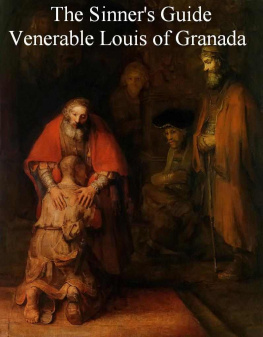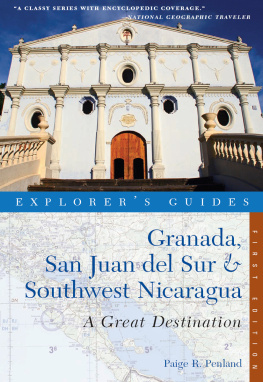Venerable Louis of Granada - The Sinner’s Guide
Here you can read online Venerable Louis of Granada - The Sinner’s Guide full text of the book (entire story) in english for free. Download pdf and epub, get meaning, cover and reviews about this ebook. year: 2012, publisher: Veritatis Splendor Publications, genre: Religion. Description of the work, (preface) as well as reviews are available. Best literature library LitArk.com created for fans of good reading and offers a wide selection of genres:
Romance novel
Science fiction
Adventure
Detective
Science
History
Home and family
Prose
Art
Politics
Computer
Non-fiction
Religion
Business
Children
Humor
Choose a favorite category and find really read worthwhile books. Enjoy immersion in the world of imagination, feel the emotions of the characters or learn something new for yourself, make an fascinating discovery.
- Book:The Sinner’s Guide
- Author:
- Publisher:Veritatis Splendor Publications
- Genre:
- Year:2012
- Rating:3 / 5
- Favourites:Add to favourites
- Your mark:
- 60
- 1
- 2
- 3
- 4
- 5
The Sinner’s Guide: summary, description and annotation
We offer to read an annotation, description, summary or preface (depends on what the author of the book "The Sinner’s Guide" wrote himself). If you haven't found the necessary information about the book — write in the comments, we will try to find it.
The Sinner’s Guide — read online for free the complete book (whole text) full work
Below is the text of the book, divided by pages. System saving the place of the last page read, allows you to conveniently read the book "The Sinner’s Guide" online for free, without having to search again every time where you left off. Put a bookmark, and you can go to the page where you finished reading at any time.
Font size:
Interval:
Bookmark:
THE SINNER'S GUIDE
Venerable Louis of Granada, OP
Translated by a Dominican Father
Edited by
Paul A. Ber, Sr.
Veritatis Splendor Publications
et cognoscetis veritatem et veritas liberabit vos
Vidimus et Approbabimus:
Fr. C. H. McKenna, OP
Fr. J. L. O'Neil, OP, Revisores Deputati
New York, November 15,1883
Imprimi Potest:
Fr. M. D. Lilly, OP, Prior Provincial
Province of St. Joseph, November 15,1883
Imprimatur:
John J. Williams, DD, Archbishop of Boston
By his Vicar General, November 22,1883
To our well-beloved Son, Louis of Granada, of the Order of Friars Preachers
Dearly Beloved Son, Health and Apostolic Benediction:
Your arduous and incessant labors, both for the conversion of sinners and for the guidance of souls to perfection, together with the valuable assistance you render those who are earnestly engaged in the work of the ministry, have always afforded us great consolation.
Your sermons and writings, filled with sublime doctrine and practical piety, are unceasingly drawing souls to God. This is particularly gratifying to us, for all who have profited by your teaching (and their number is very great) may be considered as so many souls gained to Christ. You have thus benefited your fellow creatures more than if you had given sight to the blind and raised the dead to life. For the knowledge of the Eternal Light and the enjoyment of the heavenly life, according as they are given to man on earth to know and enjoy, are far above the knowledge and enjoyment of the transitory goods of this world.
The charity with which you have devoted yourself to your great and important labor has gained for you many crowns.
Continue, then, to devote all your energies to the prosecution of your undertakings. Finish what you have begun, for we understand that you have some works yet incomplete. Give them tot he world for the health of the sick, for the strength of the weak, for the delight of Gods servants, and for the glory of the Church both militant and triumphant.
Given at Rome the 21st of July, 1582,
In the eleventh year of our pontificate.
GREGORY PP. XIII
The life of Venerable Louis of Granada (1504-1588) paralleled to a remarkable degree the greatest era of the Spanish Empire that empire known as "the evangelizer of half the world, the hammer of heretics, and the light of the Council of Trent." Louis himself is known as "the writer of the Spanish empire." He was born only shortly after the famous year 1492, when Spain had, under King Ferdinand and Queen Isabella, defeated the Moors after eight centuries of Moorish occupation and oppression in Spain and financed Christopher Columbus' momentous voyage to America. These were the times of Spain's intense exploration and missionary activity in the New World, of the Council of Trent (1548-1563), and of the great Christian victory over the Turks at Lepanto (1571).
The end of this glorious era is marked by the great defeat in 1588 of the "invincible" Spanish Armada off the coast of England, an event which signalled the beginning of the end of Spain's brief but glorious reign as a world power. This was also the very year of Louis' death. But during the early and mid-l6th century, Catholic Spain gave to the world many priceless gifts; not least of these were the books of her renowned son, Ven. Louis of Granada.
In the aftermath of the surrender of the Moors in 1492, Ferdinand and Isabella were faced with the task of making Granada a Spanish city once again. In order to hasten the influx of Spanish influence into the city and the blending of the Moorish and the Spanish people, Ferdinand and Isabella granted free entrance to the city of Granada to any Spaniard from the provinces who wished to settle there. One young couple who took advantage of this opportunity was Francis Sarri and his wife (whose name has been lost to history), a couple who in 1504 became the parents of a son named Louis, later to become famous as "Louis of Granada." Unfortunately, Francis died in 1509, and Louis and his mother were reduced to poverty, being supported by alms from the Dominican Monastery.
After a few years of destitution, there occurred an event whereby Louis de Sarri's fortunes changed suddenly and dramatically. While engaged in a street fight with a boy who had insulted his mother, Louis was discovered by the Count de Tendilla, Mayor of the Alhambra, who was impressed with his courage. The Count took Louis under his patronage. Thereafter Louis spent many hours on the balconies of the Alhambra; thus, in addition to his other education, his soul was fed by the magnificent beauty of the surrounding countryside, fueling that deep love for the beauty of nature which was to be a hallmark of his thought and writing for the rest of his life.
When Louis de Sarri reached young manhood, he turned his path toward the religious life. At the same Dominican Monastery where he had begged alms as an orphaned child, the Convent of the Holy Cross, he received the habit of a Friar Preacher on June 15, 1524, to the joyful tears of his beloved mother. A year later he made his religious profession.
At the Convent of the Holy Cross, Friar Louis, or Fray Louis, as he was called, undertook the rigorous Dominican ratio studiorum: a review of Latin and then three years of Philosophy and three years of Theology. The texts used were the grammar of Nebrija, the Summae af Peter the Spaniard, and the works of Aristotle and St. Thomas Aquinas. Louis de Sarri was brilliant in scholastic disputations; he had no equal in mental capacity, application to study, and exact observance of the monastic life.
After some time, he was awarded a scholarship to the celebrated College of St. Gregory in Valladolid. Arriving there in 1529, he spent the designated eight days in preparation for taking the oath to uphold the statutes of the College; thus Louis de Sarri became formally invested in the College of St. Gregory, taking on both the honors and the obligations thereof. In the mind of the young friar, his first duty was worthily to represent Holy Cross Convent of Granada. Grateful for the confidence placed in him by his fellow religious of Holy Cross, he changed his name from Fray Louis de Sarri to Fray Louis of Granada. With such great seriousness did the Spanish ecclesiastical student of the l6th century hold his exalted position as a knight of Thomistic truth.
The students of St. Gregory studied logic, natural philosophy, moral philosophy, theology, exegesis, and cases of conscience. Latin only was spoken, except on vacation days, when Spanish was allowed.
The first fruit of Louis' pen to appear in print was a book he did not himself write; rather, he edited one written by the Regent of Studies, Astudillo, though he himself wrote and added to the book two encomiums of Astudillo. These small works by Louis portray their author as a man enamored of philosophy, and as an authentic man of the Renaissance.
But there was more than learning in Louis' heart and soul. By prayer and penance, as well as study, he was preparing for a future apostolate of preaching.
In the year 1534, at the age of 30, because of his ardent longings for the apostolate, Louis stepped forward and generously offered himself as a missionary to Mexico. Although he had not yet completed his eight-year course of studies, he was willing to abandon the lecture halls. He was all prepared to leave for the Americas; but when his departure was imminent, Fray Louis' superior commanded him to cancel his trip and let another go in his place.
This was a tremendous disappointment for Fray Louis. In fact, although he obediently accepted the sacrifice, the longing for the mission field remained a thorn in his soul all his life. This event ushered in a deepening in the soul of Louis of Granada. More and more he realized that prayer, rather than study, is the way to true spiritual knowledge of Christ. He saw more clearly that his goal should be to live the life of Christ within his own soul, and then to preach Christ to others. He even began to have a distaste for study. In this regard, the writings of the famous Master John of Avila also had a great influence in the changing of Fray Louis' attitude. At this time there also awakened in him his vocation as a spiritual writer. He desired that the riches of the spiritual treasure should be imparted to and shared by all, and the means by which he intended to diffuse them were preaching and writing.
Font size:
Interval:
Bookmark:
Similar books «The Sinner’s Guide»
Look at similar books to The Sinner’s Guide. We have selected literature similar in name and meaning in the hope of providing readers with more options to find new, interesting, not yet read works.
Discussion, reviews of the book The Sinner’s Guide and just readers' own opinions. Leave your comments, write what you think about the work, its meaning or the main characters. Specify what exactly you liked and what you didn't like, and why you think so.


![Dzhon Makdonald - The Sinner of the Saints [story]](/uploads/posts/book/924785/thumbs/dzhon-makdonald-the-sinner-of-the-saints-story.jpg)






